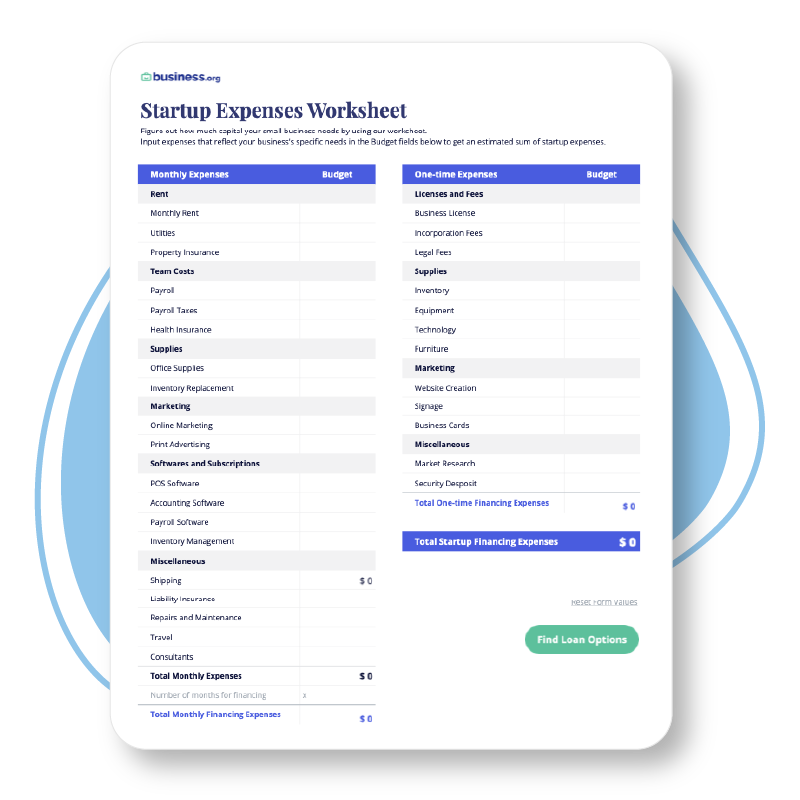💸 See if your business qualifies for a tax credit worth up to $26k per employee. 📞 Call Now: 855-979-9597
Launch a Business on a Budget: 10 Small Business Ideas Under $1,000
We are committed to sharing unbiased reviews. Some of the links on our site are from our partners who compensate us. Read our editorial guidelines and advertising disclosure.
Syndicated from The Penny Hoarder
Sometimes we think of starting a business as some major, risky, life-changing expense that will require a huge loan or major funding from investors.
But that’s simply not the case.
Sure, if you’re opening up a downtown restaurant or a retail outlet, then you’ll probably need big bucks to get off the ground.
However, there are many cheap small business ideas that don’t require near that amount of investment. With some small business ideas, you can even get started for less than $1,000.
This might not be a life-changing business at first, but it could be enough to get your entrepreneurial skills tuned up for a long-term business that grows over time.
By signing up I agree to the Terms of Use and Privacy Policy.
10 small businesses you can start for $1,000 or less
Keep in mind, you might think you have to go all out and buy brand new everything when you start your own business. But the idea here is to start small and gradually build your business revenue. That’s when you might be able to upgrade your materials and equipment.
For now, the idea is to use what you already have that fits the job. Then, buy the bare necessities while keeping your costs as low as possible. You can always pursue financing later on.
1. Pressure washing
Launching an ecommerce gig has become popular, but it can be more complicated than digital-only businesses. Because ecommerce involves selling and shipping physical goods, starting an ecommerce business can cost more than the other options we’ve listed—you’ll need money to buy the inventory you’re planning to sell.
One way to get around that is to sell things you already have, like used items on eBay or second-hand clothes on Poshmark. You can use the income from selling your own used items to buy more inventory to sell and expand your business without much cash investment. Once you have goods to sell, you can establish your online storefront on one or multiple sites, such as Amazon, Wix Ecommerce, or Etsy.
But what if you don't want to take on the risk of inventory? In that case, consider dropshipping. This business strategy involves submitting customer orders to a supplier, which in turn processes and ships the order under your brand name. You're relieved of having to store the items yourself, but it isn't all peachy. For one thing, dropshipping has a low bar to entry. This downside means profit margins are tiny as anyone can theoretically offer the same products instantly.
2. Carpet shampooing
One big perk to a carpet shampooing business is that it’s easily mobile. Since you’re working offsite, you really don’t need to invest any overhead in an office space. You simply need space to store your equipment, like a garage or laundry room.
New carpet extractors aren’t cheap and will run you at least $1,000, but you can also find professional cleaners for around $500 on Amazon. You’ll also need other related tools and cleaning products, so be sure to factor that in as well.
Similar to the pressure washing business, you’ll need some type of transportation option. Ideally, you’ll already have a truck or SUV with space. If not, you might need to invest in a used option that could raise your starting overhead significantly.
3. Handyman
Most neighborhoods have one — the trusted friend and neighbor you can rely on to help with the leaky faucet, the hole in the drywall and the broken appliance.
If that’s you, then why not make it a handyman business? Since most legit handy people already have their own tools, your startup costs here might be next to nothing. Maybe you need to update some specific tools and spend $20 here and there, but most everything you’ll need is in your garage.
That said, you might want to set aside a monthly budget for new tools or common items that get used up, like caulking, nails and so on.
4. Etsy seller
When it comes to low cost business ideas, selling on Etsy — or another ecommerce platform — tops the list. You can sign up for free and set up your online shop within minutes.
However, that’s just the online storefront part of this equation. You’ll of course have expenses related to what you actually sell, but that can vary from art, stickers, jewelry, handmade clothes, digital files and so much more. We’ll leave that alone since the related costs have such a wide range.
Etsy does expect you to know if you’re working on a business or hobby though. Here’s how Etsy explains it:
“If you’re selling on Etsy without expecting a profit, your shop may qualify as a hobby. If your Etsy shop is something you dedicate time to on a regular basis (and the time you spend is not inconsequential), and your primary purpose for the shop is for income or profit, your shop qualifies as a business.”
In that case, you should look at setting up an LLC just like any other business.
Hobby or business aside, you may want to try dropshipping if you’re buried in inventory for your ecommerce business. A dropshipping company stores your product and fulfills customer orders under your brand name for you.
Top website builders for small businesses
Want to launch your ecommerce empire easily?
5. Personal trainer
The upfront costs to start a personal training business are minimal. In most cases, if you’re interested in this as a small business idea, you’ll likely already have everything you need from a supply standpoint.
Make a checklist of everything you need — from exercise mats, kettlebells, balance balls, first aid kit, resistance bands and so on — then budget for whatever you don’t already have at home.
In the United States, you’re not required to be certified as a personal trainer. But from a marketing standpoint, you’ll probably want to get certified. Plus, most gyms won’t hire you or allow you to use their space if you aren’t certified. Personal trainer certification can cost anywhere from $200 to $2,000 depending on the level of training you want.
If weights and balance balls aren’t necessarily your thing or you’d rather stick to simple cardio like running, then you could always look into being a certified running coach.
6. Travel planner
Going the traditional travel agent route can be pretty expensive in the beginning. That said, there is a new age of business models that allow you to get started at a much lower cost.
For example, Thatch has a free mobile app that allows travelers to create their own travel-based businesses. Over the last decade, sharing a travel experience over Instagram or TikTok has resulted in many pop-up business models.
Thatch has formalized that experience and allows users to curate, share and sell interactive travel guides and planning services. It’s free to get started on Thatch, and the company will take 10% of whatever you earn.
Trova offers a similar model but is more group-focused. And not only do users plan the trip, they also travel with their group as a host.
So, yes, you’ll spend more than $1,000 on trips but if you’re going anyway, you’ll only be out the time to gather your thoughts and share your experiences. That itinerary you made for yourself could sell over and over again on Thatch. Hello, passive income!
7. Tour guide
If you live in or near a town that offers sightseeing opportunities, you could start a tour guide business with fairly low overhead costs.
You can easily set up shop from a home, so your main expenses will be ensuring you have transportation, unless you’re strictly doing walking tours — which would, of course, be much cheaper, assuming you live in a metropolitan area fit for a good walking tour.
If not, used vans can be had for less than $3,000 or maybe you partner with a local bike shop to do bike tours. You’ll also want to make sure people know about your business through some basic marketing, maybe through social media, Airbnb experiences, tour sites or a free website through a hosting company like GoDaddy or SquareSpace. (More on that too.)
If you’d like more help getting started, you can also offer your services through tour guide platforms. Basically, you can apply for free, they might conduct a brief interview or two, then you can be listed as a guide in your area. For every client you serve, they may take a cut — usually around 15% to 20%.
8. Laundry service
Yes, you could actually start your own laundry business. This is a perfect idea if you’re the type of person who uses laundry time as a kind of therapy.
The easiest way to do this is by using a service like TaskRabbit, Care.com and Laundry Care — which might involve an initial registration fee between $25 to $100.
A laundry business is even more doable if you already own a washer, dryer and some form of transportation. Other than that, you might want to invest in things like laundry bags and hampers, garment covers, bag tags and a hanging scale.
Your upfront investment on a laundry business will be next to nothing, assuming you already have a washer and dryer and a car if you plan to offer pick up and delivery.
9. Dog walking
Talk about almost non-existent startup costs! A dog walking business will cost you next to nothing. All you really need is the ability to walk and the patience to keep up with Rover — or slow down for the many potty breaks.
Though dog walking businesses have been around for a long time, it’s taken off in some metropolitan areas like New York City, with some people making more than six figures a year! In addition, more than 23 million American households got a pet during the pandemic, according to the ASPCA. That’s nearly one in five households, and a lot of pets who need to go for a stroll.
Starting a dog walking business is easy through online sites like Rover and Wag. You’ll set your rates, pay an initial profile review fee ($35 on Rover and $29.95 on Wag), then Rover or Wag will take a percentage from each walk as well. A search in the Nashville area showed individuals making $15 to $30 per walk.
Pro tip: You don’t even have to walk a dog to make money off the pet industry. You could rent your yard out as a private dog park on Sniffspot.
10. Professional organizer
If you’re gifted with the talent of organizing, you’ve already completed half the battle in starting an organization business.
To give your new business some credibility, you may want to consider joining an organization like NAPO — the National Association of Productivity and Organizing Professionals. A provisional membership costs $319 and gives you loads of benefits, including access to many of NAPO’s certification courses. These certifications will only boost your organizational resume.
After that, you can spread the word about your new businesses. Consider starting with friends and neighbors, so you can have few success stories to tout on your website.
Everything else you need to know to start a small business
If you’re really serious about this low cost business idea, you should set up a limited liability company (LLC) before you do anything. You could also set up a sole proprietorship or corporations, but most experts agree that an LLC is the easiest and best option for solo business owners getting started.
What you need to know about an LLC
The most important aspect of an LLC is the liability protections it offers you as a business owner. Basically your personal assets and net worth are protected from any legal action taken against your business. LLCs also offer more tax protections than a corporation, which are hit with corporate taxes in addition to the owners getting taxed on their dividends.
You don’t necessarily need a lawyer to start an LLC. Depending on the state where you live, you may be able to register your LLC online. Once you get your business entity started, you also won’t have quite as many restrictions on how you operate your company as you would with a corporation.
Depending on your state, an LLC can run anywhere from $100 to $700 annually. Some states will require annual renewal fees too.
But that’s not all you’ll need to think about on the legal front.
What about liability insurance?
While an LLC protects you personally, your business could still get sued. General liability insurance can help protect you from lawsuits for injury or property damage. Our top pick? Tivly.
The more risk you take on as a business owner, the more liability protection your business will need. For example, if you transport clients in your tour guide van or get into pressure washing, you may need liability insurance. Selling crafts on Etsy? Probably not.
General liability insurance can cost around $30 to $100 per month, depending on your business.
What about marketing?
You’ve started your business. You’ve got a client or two. But now you need to spread the word.
The easiest and cheapest way to do this is through social media accounts. Instagram and TikTok are visual mediums that can be very effective when used strategically. You can also build professional connections through LinkedIn.
To keep costs low, you can use one of the many DIY website builder platforms out there. Options include IONOS, Wix, Bluehost or GoDaddy. These site builders will cost you anywhere from a few bucks to about $25 per month, but you can get the word out about your business without having to invest too much on the front end.
You can also hire a freelance designer to build your small business website, but you can expect to pay around a couple hundred dollars.
Start your business small and smart
A new business doesn’t have to cost a fortune. Start slow with the bare bones basics, then build up as your business builds.
You don’t need a brand new van to start a tour guide company, and you don’t need every cleaning product under the sun to get your carpet shampooing business off the ground.
Keep it simple and smart, build your client base, then watch as that small investment of $1,000 becomes a profitable business idea over time.
Robert Bruce is a senior staff writer at The Penny Hoarder covering earning, saving and managing money. He has written about personal finance for more than a decade.
Need a bank account for your new biz? Here's our top picks.
Data effective 1/10/23. At publishing time, rates, fees, and requirements are current but are subject to change. Offers may not be available in all areas.
Related reading
Disclaimer
At Business.org, our research is meant to offer general product and service recommendations. We don't guarantee that our suggestions will work best for each individual or business, so consider your unique needs when choosing products and services.










